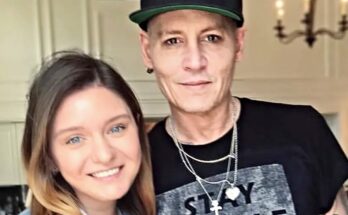Have you ever wondered what it truly feels like to live your entire life under the world’s brightest spotlight while carrying the darkest secrets in the shadows? Imagine walking on stage, hearing thousands of people scream your name, smiling for the cameras, and giving interviews where every word is replayed across the globe. Now imagine doing all that while holding on to something you never dared to share. Something so heavy that every smile feels like a mask. That’s not just a dramatic movie plot. That has been Johnny Depp’s life for decades. And now at the age of 62, those decades of silence have finally been shattered. Johnny has been a cultural giant for so long that it’s almost hard to picture Hollywood without him. His career has stretched across generations. Parents, children, even grandchildren have grown up watching his movies. He’s been admired, ridiculed, idolized, and criticized. And through it all, he kept his personal truth hidden away. As if behind a locked door that no one was allowed to open. But here’s the thing about silence. It doesn’t disappear. It builds. It grows heavier. And sooner or later, it demands to be broken. For Johnny, 62 was the age where that door finally creaked open. And what poured out was raw, imperfect, and deeply human. We live in a world where it’s easy to believe we know celebrities. Social media, interviews, red carpets, they all create this illusion of intimacy. We think we see the real person when in reality we’re only seeing what’s been carefully curated. Johnny Depp is no different. For decades, we saw the rebel artist, the mysterious outsider, the man who didn’t play by Hollywood’s rules. That was the story the world loved. And that was the story he gave us. But what about the parts that didn’t fit? The insecurities, the pain, the chaos, the loneliness. Those were kept out of sight. And isn’t that the case for so many of us? The world sees the version we present while the truth stays hidden in silence. The thing about Johnny is that his truth has always been there just below the surface. Look closely at his characters and you can feel it. They weren’t just roles. They were fragments of him. Pieces of pain, longing, humor, and sadness mixed together. And maybe that’s why audiences connected so strongly with his performances. They weren’t polished perfection. They were messy, emotional, and real. That kind of honesty doesn’t come from pretending. It comes from lived experience. But behind the curtain, away from the cameras, Johnny fought his private battles. Battles that the world couldn’t see, and battles that he didn’t always have the words to share. Silence became his shield. He wore it like armor, protecting himself from judgment, from gossip, from exploitation. But silence isn’t healing. Silence is heavy. And the longer you carry it, the more it weighs you down. Imagine carrying a stone in your pocket every day of your life. At first, it’s nothing. Over time, it becomes heavier. Not because the stone itself changes, but because the weight of carrying it never ends. That’s what silence does. So why now? Why break that silence at 62? The answer is simple but profound. Age changes you. With time comes reflection. You stop living for applause. You stop worrying about judgment. And you realize that peace doesn’t come from pretending. It comes from telling the truth. When Johnny finally opened up, it wasn’t polished. It wasn’t glamorous. It was unfiltered, raw honesty. And that honesty was more powerful than any role he’s ever played. The lesson here isn’t about Hollywood drama. It’s about humanity. It’s about the fact that every single one of us carries truths we don’t share. Some of us hide pain. Some of us hide fear. Some of us hide who we really are because we’re terrified the world won’t accept it. But here’s the reality. Silence doesn’t protect you. It imprisons you. And Johnny’s story is proof of that. For decades, he turned to art as his escape. acting, music, painting. These were his ways of saying the things he couldn’t put into words. And maybe you do the same thing. Maybe you write in a journal. Maybe you play music when no one’s listening. Maybe you draw or run or just sit quietly in the dark. Expression doesn’t always need to be public. Sometimes it’s simply the act of releasing what’s inside. But here’s the thing. Expression is survival. It’s how the human soul keeps itself from breaking. Experts often say that bottling up pain makes it worse. It magnifies it. It twists it. But letting it out, whether through art,


